Psychosocial influences on a Dementia patient
VerifiedAdded on 2022/10/13
|7
|2689
|441
Essay
AI Summary
6NURSING ADULT NURSING Psychosocial influences on a Dementia patient Student Name University Name Author Note Psychosocial influences on a Dementia patient Dementia is a dominant disease that is affecting people over the age of 65 in all countries (Wu et al. There was a community placement conducted in which a dementia patient aged 68 years named Mr Johnson was an active participant. It stands measured that people over the age of 65 have a higher risk of suffering from an acute form of dementia (Satiza
Contribute Materials
Your contribution can guide someone’s learning journey. Share your
documents today.
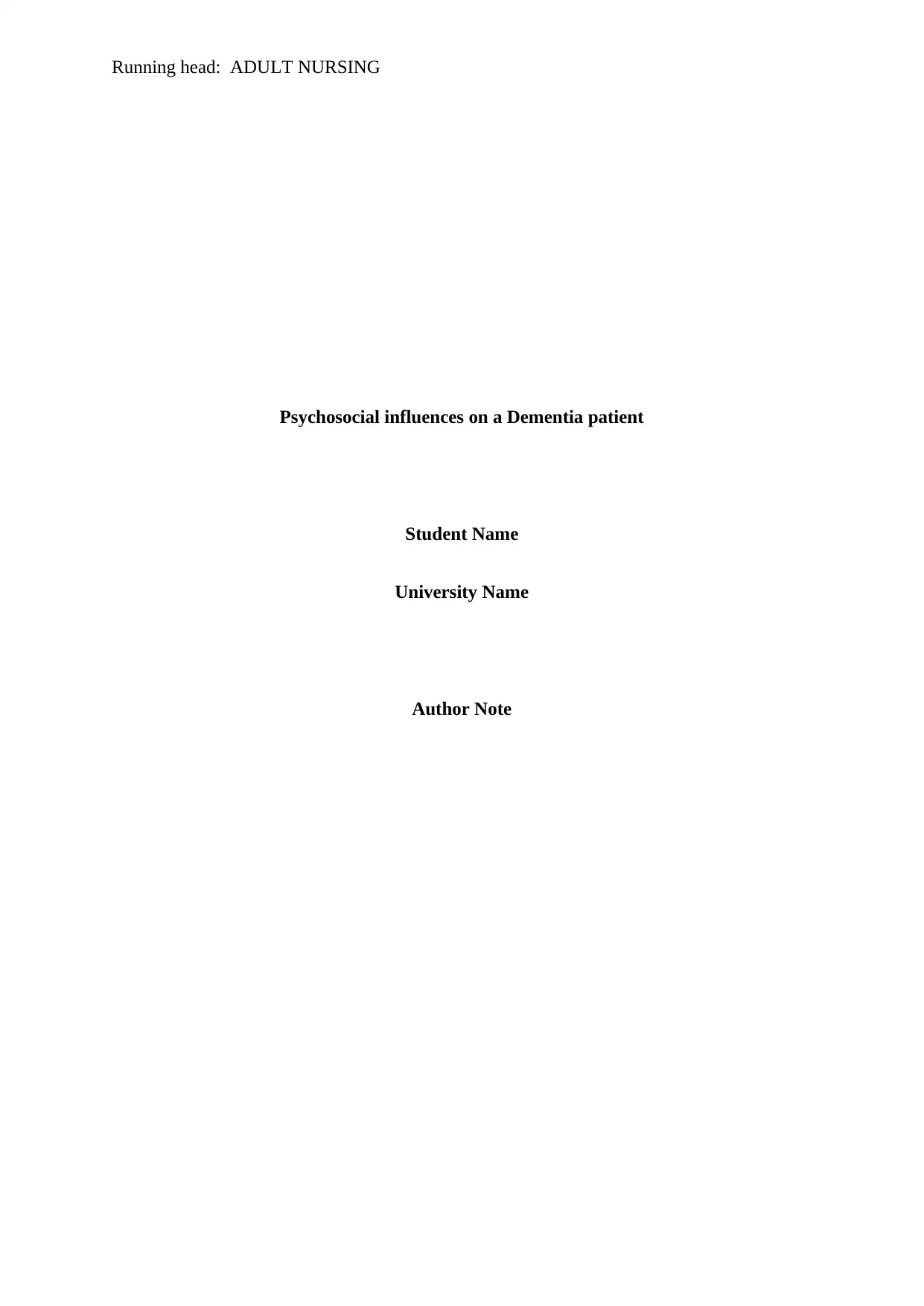
Running head: ADULT NURSING
Psychosocial influences on a Dementia patient
Student Name
University Name
Author Note
Psychosocial influences on a Dementia patient
Student Name
University Name
Author Note
Secure Best Marks with AI Grader
Need help grading? Try our AI Grader for instant feedback on your assignments.
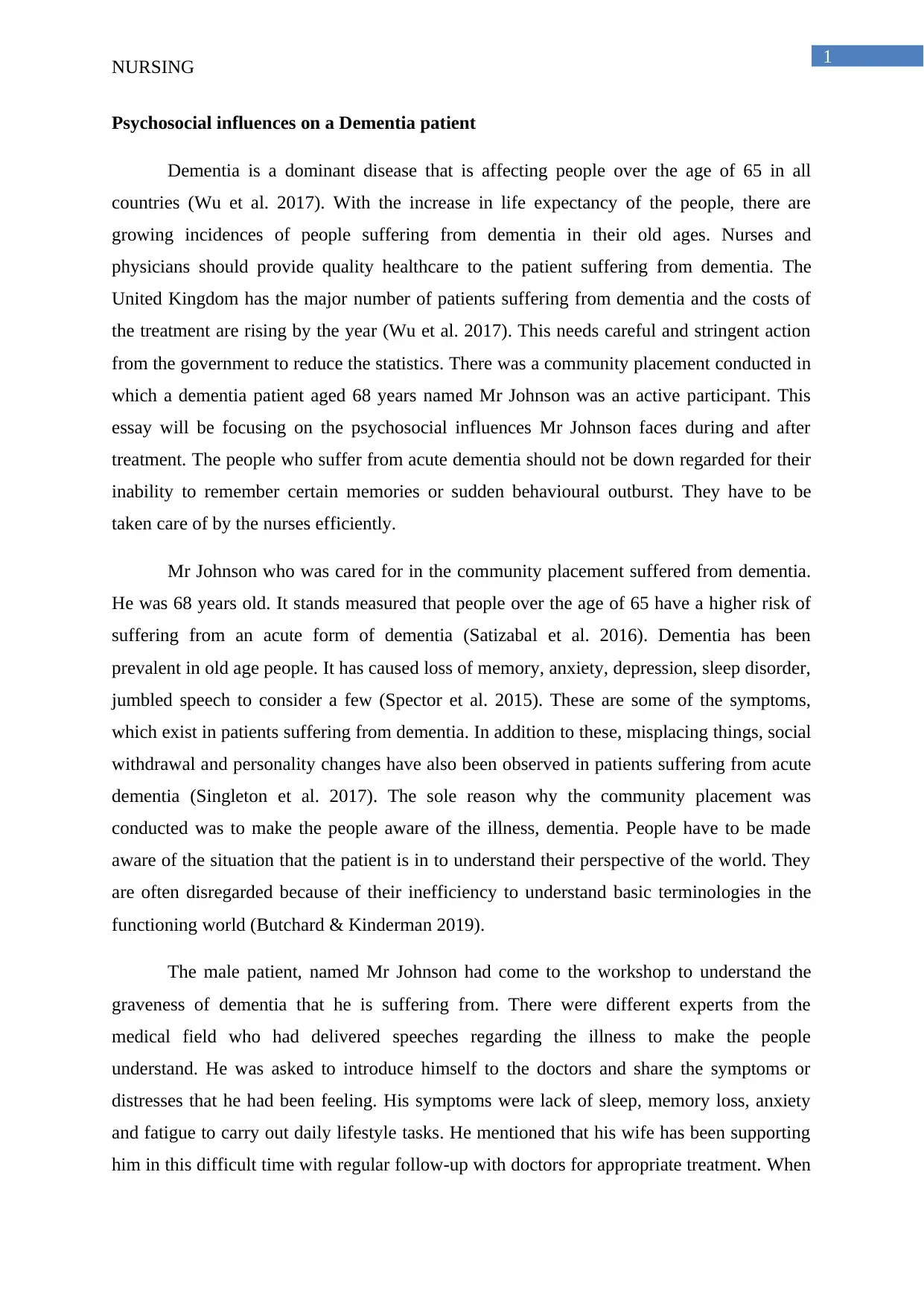
1
NURSING
Psychosocial influences on a Dementia patient
Dementia is a dominant disease that is affecting people over the age of 65 in all
countries (Wu et al. 2017). With the increase in life expectancy of the people, there are
growing incidences of people suffering from dementia in their old ages. Nurses and
physicians should provide quality healthcare to the patient suffering from dementia. The
United Kingdom has the major number of patients suffering from dementia and the costs of
the treatment are rising by the year (Wu et al. 2017). This needs careful and stringent action
from the government to reduce the statistics. There was a community placement conducted in
which a dementia patient aged 68 years named Mr Johnson was an active participant. This
essay will be focusing on the psychosocial influences Mr Johnson faces during and after
treatment. The people who suffer from acute dementia should not be down regarded for their
inability to remember certain memories or sudden behavioural outburst. They have to be
taken care of by the nurses efficiently.
Mr Johnson who was cared for in the community placement suffered from dementia.
He was 68 years old. It stands measured that people over the age of 65 have a higher risk of
suffering from an acute form of dementia (Satizabal et al. 2016). Dementia has been
prevalent in old age people. It has caused loss of memory, anxiety, depression, sleep disorder,
jumbled speech to consider a few (Spector et al. 2015). These are some of the symptoms,
which exist in patients suffering from dementia. In addition to these, misplacing things, social
withdrawal and personality changes have also been observed in patients suffering from acute
dementia (Singleton et al. 2017). The sole reason why the community placement was
conducted was to make the people aware of the illness, dementia. People have to be made
aware of the situation that the patient is in to understand their perspective of the world. They
are often disregarded because of their inefficiency to understand basic terminologies in the
functioning world (Butchard & Kinderman 2019).
The male patient, named Mr Johnson had come to the workshop to understand the
graveness of dementia that he is suffering from. There were different experts from the
medical field who had delivered speeches regarding the illness to make the people
understand. He was asked to introduce himself to the doctors and share the symptoms or
distresses that he had been feeling. His symptoms were lack of sleep, memory loss, anxiety
and fatigue to carry out daily lifestyle tasks. He mentioned that his wife has been supporting
him in this difficult time with regular follow-up with doctors for appropriate treatment. When
NURSING
Psychosocial influences on a Dementia patient
Dementia is a dominant disease that is affecting people over the age of 65 in all
countries (Wu et al. 2017). With the increase in life expectancy of the people, there are
growing incidences of people suffering from dementia in their old ages. Nurses and
physicians should provide quality healthcare to the patient suffering from dementia. The
United Kingdom has the major number of patients suffering from dementia and the costs of
the treatment are rising by the year (Wu et al. 2017). This needs careful and stringent action
from the government to reduce the statistics. There was a community placement conducted in
which a dementia patient aged 68 years named Mr Johnson was an active participant. This
essay will be focusing on the psychosocial influences Mr Johnson faces during and after
treatment. The people who suffer from acute dementia should not be down regarded for their
inability to remember certain memories or sudden behavioural outburst. They have to be
taken care of by the nurses efficiently.
Mr Johnson who was cared for in the community placement suffered from dementia.
He was 68 years old. It stands measured that people over the age of 65 have a higher risk of
suffering from an acute form of dementia (Satizabal et al. 2016). Dementia has been
prevalent in old age people. It has caused loss of memory, anxiety, depression, sleep disorder,
jumbled speech to consider a few (Spector et al. 2015). These are some of the symptoms,
which exist in patients suffering from dementia. In addition to these, misplacing things, social
withdrawal and personality changes have also been observed in patients suffering from acute
dementia (Singleton et al. 2017). The sole reason why the community placement was
conducted was to make the people aware of the illness, dementia. People have to be made
aware of the situation that the patient is in to understand their perspective of the world. They
are often disregarded because of their inefficiency to understand basic terminologies in the
functioning world (Butchard & Kinderman 2019).
The male patient, named Mr Johnson had come to the workshop to understand the
graveness of dementia that he is suffering from. There were different experts from the
medical field who had delivered speeches regarding the illness to make the people
understand. He was asked to introduce himself to the doctors and share the symptoms or
distresses that he had been feeling. His symptoms were lack of sleep, memory loss, anxiety
and fatigue to carry out daily lifestyle tasks. He mentioned that his wife has been supporting
him in this difficult time with regular follow-up with doctors for appropriate treatment. When
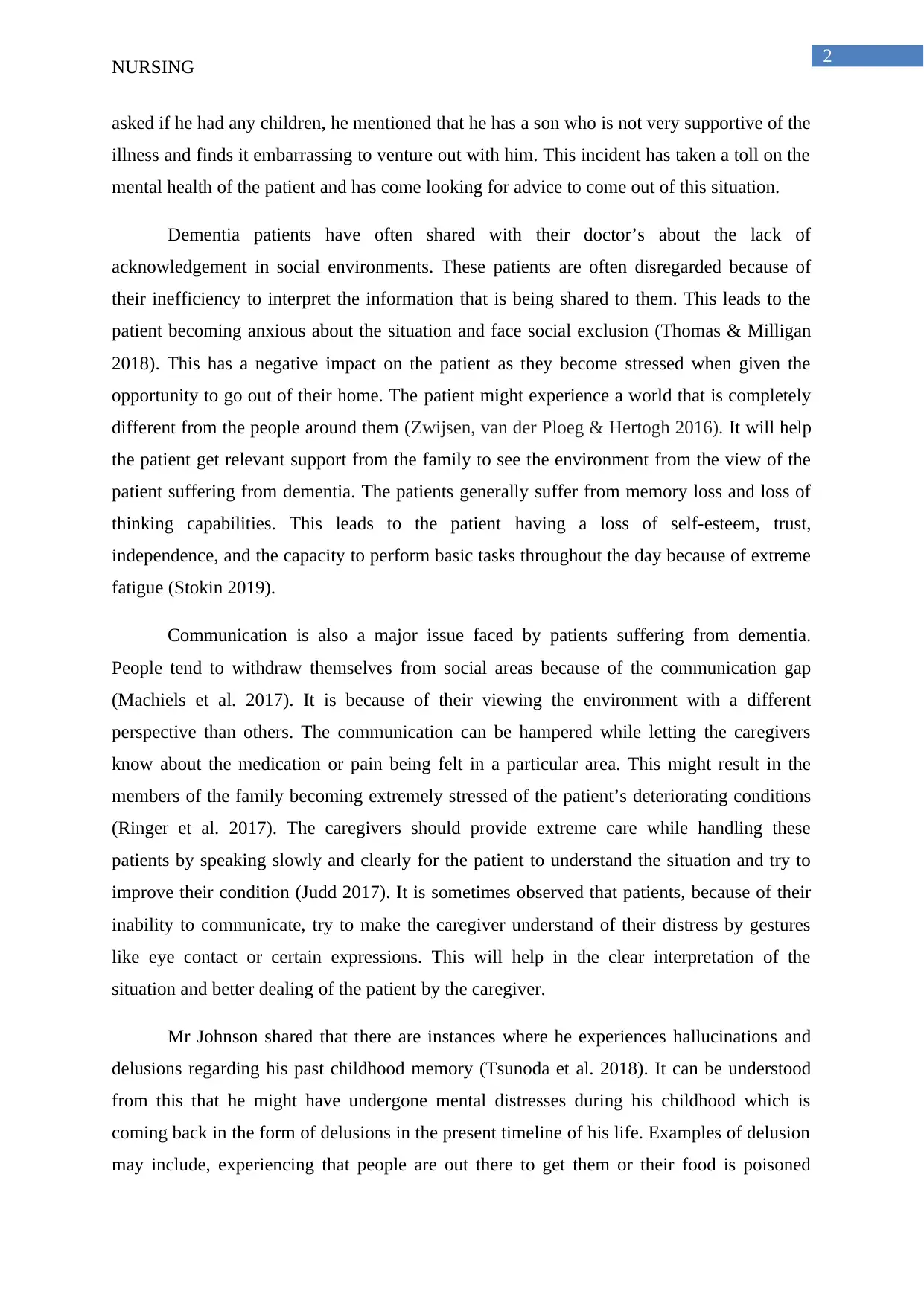
2
NURSING
asked if he had any children, he mentioned that he has a son who is not very supportive of the
illness and finds it embarrassing to venture out with him. This incident has taken a toll on the
mental health of the patient and has come looking for advice to come out of this situation.
Dementia patients have often shared with their doctor’s about the lack of
acknowledgement in social environments. These patients are often disregarded because of
their inefficiency to interpret the information that is being shared to them. This leads to the
patient becoming anxious about the situation and face social exclusion (Thomas & Milligan
2018). This has a negative impact on the patient as they become stressed when given the
opportunity to go out of their home. The patient might experience a world that is completely
different from the people around them (Zwijsen, van der Ploeg & Hertogh 2016). It will help
the patient get relevant support from the family to see the environment from the view of the
patient suffering from dementia. The patients generally suffer from memory loss and loss of
thinking capabilities. This leads to the patient having a loss of self-esteem, trust,
independence, and the capacity to perform basic tasks throughout the day because of extreme
fatigue (Stokin 2019).
Communication is also a major issue faced by patients suffering from dementia.
People tend to withdraw themselves from social areas because of the communication gap
(Machiels et al. 2017). It is because of their viewing the environment with a different
perspective than others. The communication can be hampered while letting the caregivers
know about the medication or pain being felt in a particular area. This might result in the
members of the family becoming extremely stressed of the patient’s deteriorating conditions
(Ringer et al. 2017). The caregivers should provide extreme care while handling these
patients by speaking slowly and clearly for the patient to understand the situation and try to
improve their condition (Judd 2017). It is sometimes observed that patients, because of their
inability to communicate, try to make the caregiver understand of their distress by gestures
like eye contact or certain expressions. This will help in the clear interpretation of the
situation and better dealing of the patient by the caregiver.
Mr Johnson shared that there are instances where he experiences hallucinations and
delusions regarding his past childhood memory (Tsunoda et al. 2018). It can be understood
from this that he might have undergone mental distresses during his childhood which is
coming back in the form of delusions in the present timeline of his life. Examples of delusion
may include, experiencing that people are out there to get them or their food is poisoned
NURSING
asked if he had any children, he mentioned that he has a son who is not very supportive of the
illness and finds it embarrassing to venture out with him. This incident has taken a toll on the
mental health of the patient and has come looking for advice to come out of this situation.
Dementia patients have often shared with their doctor’s about the lack of
acknowledgement in social environments. These patients are often disregarded because of
their inefficiency to interpret the information that is being shared to them. This leads to the
patient becoming anxious about the situation and face social exclusion (Thomas & Milligan
2018). This has a negative impact on the patient as they become stressed when given the
opportunity to go out of their home. The patient might experience a world that is completely
different from the people around them (Zwijsen, van der Ploeg & Hertogh 2016). It will help
the patient get relevant support from the family to see the environment from the view of the
patient suffering from dementia. The patients generally suffer from memory loss and loss of
thinking capabilities. This leads to the patient having a loss of self-esteem, trust,
independence, and the capacity to perform basic tasks throughout the day because of extreme
fatigue (Stokin 2019).
Communication is also a major issue faced by patients suffering from dementia.
People tend to withdraw themselves from social areas because of the communication gap
(Machiels et al. 2017). It is because of their viewing the environment with a different
perspective than others. The communication can be hampered while letting the caregivers
know about the medication or pain being felt in a particular area. This might result in the
members of the family becoming extremely stressed of the patient’s deteriorating conditions
(Ringer et al. 2017). The caregivers should provide extreme care while handling these
patients by speaking slowly and clearly for the patient to understand the situation and try to
improve their condition (Judd 2017). It is sometimes observed that patients, because of their
inability to communicate, try to make the caregiver understand of their distress by gestures
like eye contact or certain expressions. This will help in the clear interpretation of the
situation and better dealing of the patient by the caregiver.
Mr Johnson shared that there are instances where he experiences hallucinations and
delusions regarding his past childhood memory (Tsunoda et al. 2018). It can be understood
from this that he might have undergone mental distresses during his childhood which is
coming back in the form of delusions in the present timeline of his life. Examples of delusion
may include, experiencing that people are out there to get them or their food is poisoned
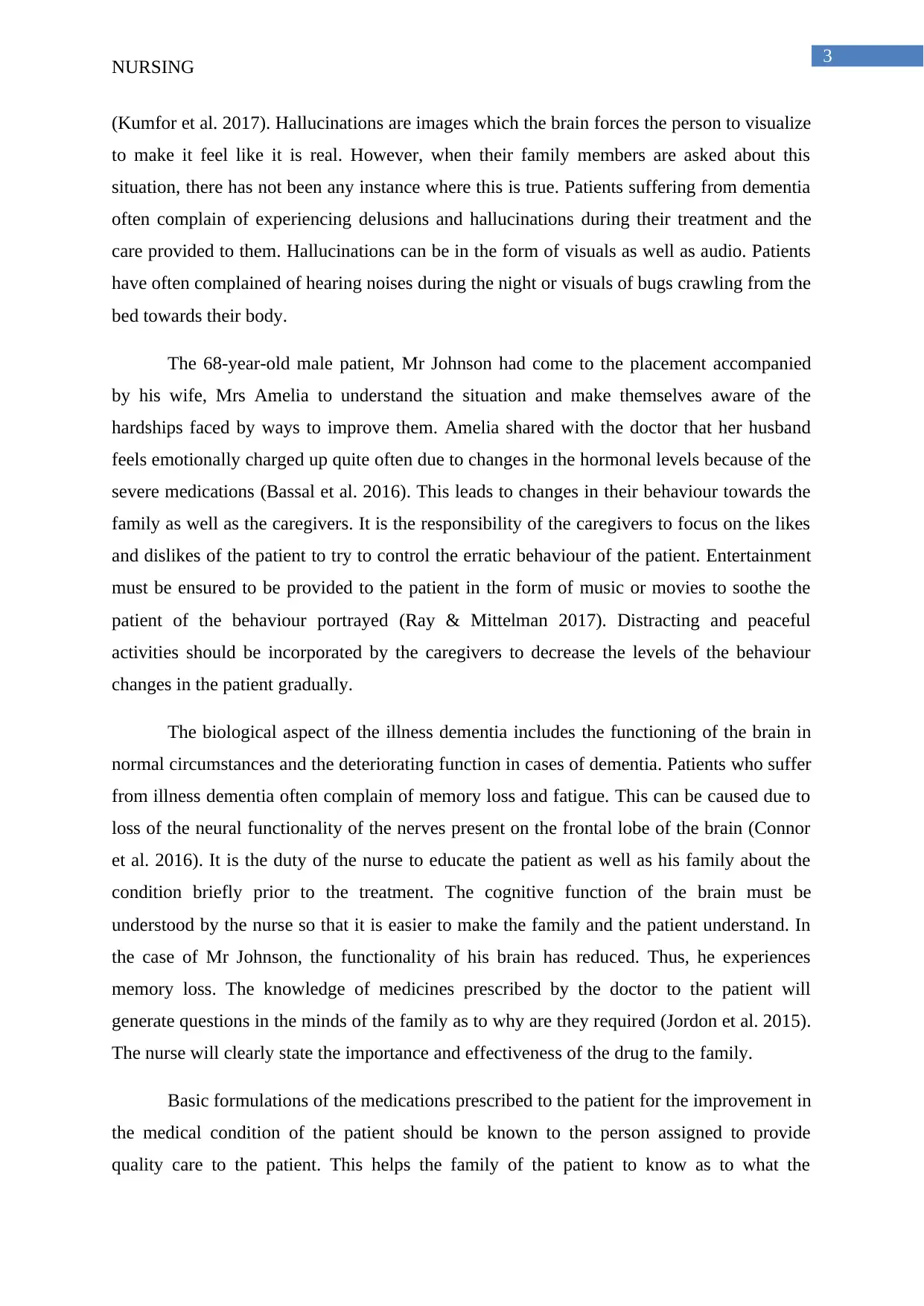
3
NURSING
(Kumfor et al. 2017). Hallucinations are images which the brain forces the person to visualize
to make it feel like it is real. However, when their family members are asked about this
situation, there has not been any instance where this is true. Patients suffering from dementia
often complain of experiencing delusions and hallucinations during their treatment and the
care provided to them. Hallucinations can be in the form of visuals as well as audio. Patients
have often complained of hearing noises during the night or visuals of bugs crawling from the
bed towards their body.
The 68-year-old male patient, Mr Johnson had come to the placement accompanied
by his wife, Mrs Amelia to understand the situation and make themselves aware of the
hardships faced by ways to improve them. Amelia shared with the doctor that her husband
feels emotionally charged up quite often due to changes in the hormonal levels because of the
severe medications (Bassal et al. 2016). This leads to changes in their behaviour towards the
family as well as the caregivers. It is the responsibility of the caregivers to focus on the likes
and dislikes of the patient to try to control the erratic behaviour of the patient. Entertainment
must be ensured to be provided to the patient in the form of music or movies to soothe the
patient of the behaviour portrayed (Ray & Mittelman 2017). Distracting and peaceful
activities should be incorporated by the caregivers to decrease the levels of the behaviour
changes in the patient gradually.
The biological aspect of the illness dementia includes the functioning of the brain in
normal circumstances and the deteriorating function in cases of dementia. Patients who suffer
from illness dementia often complain of memory loss and fatigue. This can be caused due to
loss of the neural functionality of the nerves present on the frontal lobe of the brain (Connor
et al. 2016). It is the duty of the nurse to educate the patient as well as his family about the
condition briefly prior to the treatment. The cognitive function of the brain must be
understood by the nurse so that it is easier to make the family and the patient understand. In
the case of Mr Johnson, the functionality of his brain has reduced. Thus, he experiences
memory loss. The knowledge of medicines prescribed by the doctor to the patient will
generate questions in the minds of the family as to why are they required (Jordon et al. 2015).
The nurse will clearly state the importance and effectiveness of the drug to the family.
Basic formulations of the medications prescribed to the patient for the improvement in
the medical condition of the patient should be known to the person assigned to provide
quality care to the patient. This helps the family of the patient to know as to what the
NURSING
(Kumfor et al. 2017). Hallucinations are images which the brain forces the person to visualize
to make it feel like it is real. However, when their family members are asked about this
situation, there has not been any instance where this is true. Patients suffering from dementia
often complain of experiencing delusions and hallucinations during their treatment and the
care provided to them. Hallucinations can be in the form of visuals as well as audio. Patients
have often complained of hearing noises during the night or visuals of bugs crawling from the
bed towards their body.
The 68-year-old male patient, Mr Johnson had come to the placement accompanied
by his wife, Mrs Amelia to understand the situation and make themselves aware of the
hardships faced by ways to improve them. Amelia shared with the doctor that her husband
feels emotionally charged up quite often due to changes in the hormonal levels because of the
severe medications (Bassal et al. 2016). This leads to changes in their behaviour towards the
family as well as the caregivers. It is the responsibility of the caregivers to focus on the likes
and dislikes of the patient to try to control the erratic behaviour of the patient. Entertainment
must be ensured to be provided to the patient in the form of music or movies to soothe the
patient of the behaviour portrayed (Ray & Mittelman 2017). Distracting and peaceful
activities should be incorporated by the caregivers to decrease the levels of the behaviour
changes in the patient gradually.
The biological aspect of the illness dementia includes the functioning of the brain in
normal circumstances and the deteriorating function in cases of dementia. Patients who suffer
from illness dementia often complain of memory loss and fatigue. This can be caused due to
loss of the neural functionality of the nerves present on the frontal lobe of the brain (Connor
et al. 2016). It is the duty of the nurse to educate the patient as well as his family about the
condition briefly prior to the treatment. The cognitive function of the brain must be
understood by the nurse so that it is easier to make the family and the patient understand. In
the case of Mr Johnson, the functionality of his brain has reduced. Thus, he experiences
memory loss. The knowledge of medicines prescribed by the doctor to the patient will
generate questions in the minds of the family as to why are they required (Jordon et al. 2015).
The nurse will clearly state the importance and effectiveness of the drug to the family.
Basic formulations of the medications prescribed to the patient for the improvement in
the medical condition of the patient should be known to the person assigned to provide
quality care to the patient. This helps the family of the patient to know as to what the
Secure Best Marks with AI Grader
Need help grading? Try our AI Grader for instant feedback on your assignments.
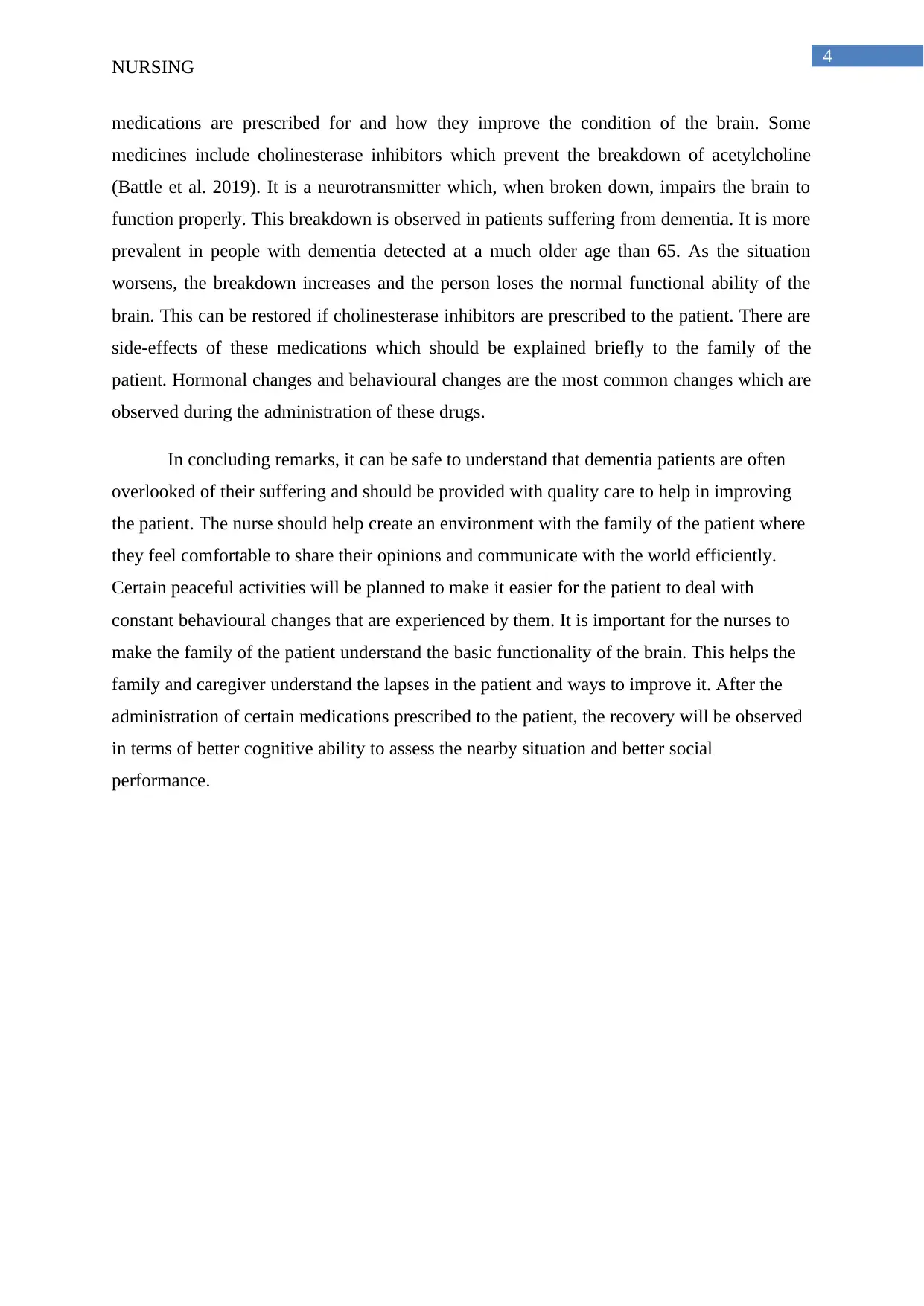
4
NURSING
medications are prescribed for and how they improve the condition of the brain. Some
medicines include cholinesterase inhibitors which prevent the breakdown of acetylcholine
(Battle et al. 2019). It is a neurotransmitter which, when broken down, impairs the brain to
function properly. This breakdown is observed in patients suffering from dementia. It is more
prevalent in people with dementia detected at a much older age than 65. As the situation
worsens, the breakdown increases and the person loses the normal functional ability of the
brain. This can be restored if cholinesterase inhibitors are prescribed to the patient. There are
side-effects of these medications which should be explained briefly to the family of the
patient. Hormonal changes and behavioural changes are the most common changes which are
observed during the administration of these drugs.
In concluding remarks, it can be safe to understand that dementia patients are often
overlooked of their suffering and should be provided with quality care to help in improving
the patient. The nurse should help create an environment with the family of the patient where
they feel comfortable to share their opinions and communicate with the world efficiently.
Certain peaceful activities will be planned to make it easier for the patient to deal with
constant behavioural changes that are experienced by them. It is important for the nurses to
make the family of the patient understand the basic functionality of the brain. This helps the
family and caregiver understand the lapses in the patient and ways to improve it. After the
administration of certain medications prescribed to the patient, the recovery will be observed
in terms of better cognitive ability to assess the nearby situation and better social
performance.
NURSING
medications are prescribed for and how they improve the condition of the brain. Some
medicines include cholinesterase inhibitors which prevent the breakdown of acetylcholine
(Battle et al. 2019). It is a neurotransmitter which, when broken down, impairs the brain to
function properly. This breakdown is observed in patients suffering from dementia. It is more
prevalent in people with dementia detected at a much older age than 65. As the situation
worsens, the breakdown increases and the person loses the normal functional ability of the
brain. This can be restored if cholinesterase inhibitors are prescribed to the patient. There are
side-effects of these medications which should be explained briefly to the family of the
patient. Hormonal changes and behavioural changes are the most common changes which are
observed during the administration of these drugs.
In concluding remarks, it can be safe to understand that dementia patients are often
overlooked of their suffering and should be provided with quality care to help in improving
the patient. The nurse should help create an environment with the family of the patient where
they feel comfortable to share their opinions and communicate with the world efficiently.
Certain peaceful activities will be planned to make it easier for the patient to deal with
constant behavioural changes that are experienced by them. It is important for the nurses to
make the family of the patient understand the basic functionality of the brain. This helps the
family and caregiver understand the lapses in the patient and ways to improve it. After the
administration of certain medications prescribed to the patient, the recovery will be observed
in terms of better cognitive ability to assess the nearby situation and better social
performance.
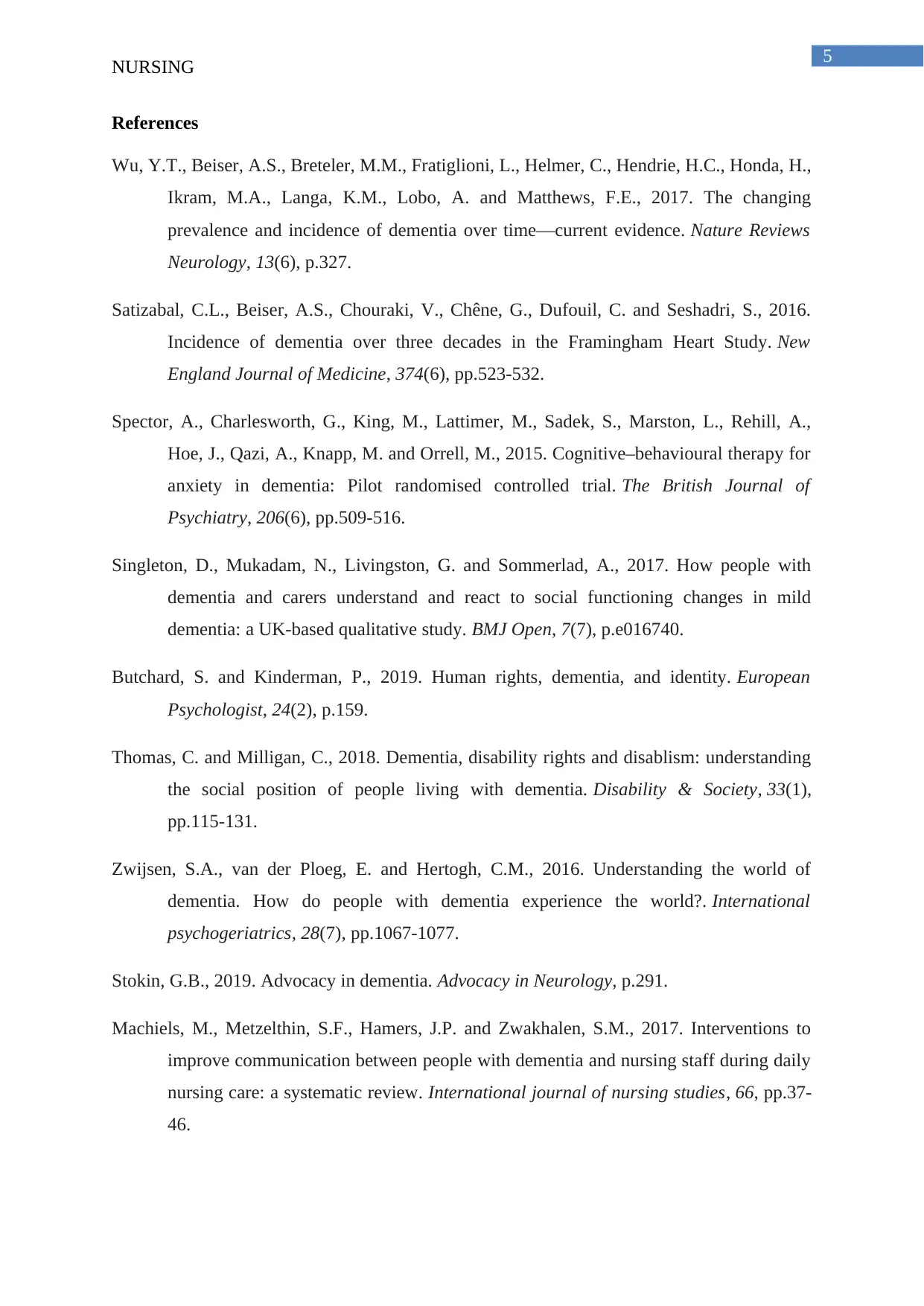
5
NURSING
References
Wu, Y.T., Beiser, A.S., Breteler, M.M., Fratiglioni, L., Helmer, C., Hendrie, H.C., Honda, H.,
Ikram, M.A., Langa, K.M., Lobo, A. and Matthews, F.E., 2017. The changing
prevalence and incidence of dementia over time—current evidence. Nature Reviews
Neurology, 13(6), p.327.
Satizabal, C.L., Beiser, A.S., Chouraki, V., Chêne, G., Dufouil, C. and Seshadri, S., 2016.
Incidence of dementia over three decades in the Framingham Heart Study. New
England Journal of Medicine, 374(6), pp.523-532.
Spector, A., Charlesworth, G., King, M., Lattimer, M., Sadek, S., Marston, L., Rehill, A.,
Hoe, J., Qazi, A., Knapp, M. and Orrell, M., 2015. Cognitive–behavioural therapy for
anxiety in dementia: Pilot randomised controlled trial. The British Journal of
Psychiatry, 206(6), pp.509-516.
Singleton, D., Mukadam, N., Livingston, G. and Sommerlad, A., 2017. How people with
dementia and carers understand and react to social functioning changes in mild
dementia: a UK-based qualitative study. BMJ Open, 7(7), p.e016740.
Butchard, S. and Kinderman, P., 2019. Human rights, dementia, and identity. European
Psychologist, 24(2), p.159.
Thomas, C. and Milligan, C., 2018. Dementia, disability rights and disablism: understanding
the social position of people living with dementia. Disability & Society, 33(1),
pp.115-131.
Zwijsen, S.A., van der Ploeg, E. and Hertogh, C.M., 2016. Understanding the world of
dementia. How do people with dementia experience the world?. International
psychogeriatrics, 28(7), pp.1067-1077.
Stokin, G.B., 2019. Advocacy in dementia. Advocacy in Neurology, p.291.
Machiels, M., Metzelthin, S.F., Hamers, J.P. and Zwakhalen, S.M., 2017. Interventions to
improve communication between people with dementia and nursing staff during daily
nursing care: a systematic review. International journal of nursing studies, 66, pp.37-
46.
NURSING
References
Wu, Y.T., Beiser, A.S., Breteler, M.M., Fratiglioni, L., Helmer, C., Hendrie, H.C., Honda, H.,
Ikram, M.A., Langa, K.M., Lobo, A. and Matthews, F.E., 2017. The changing
prevalence and incidence of dementia over time—current evidence. Nature Reviews
Neurology, 13(6), p.327.
Satizabal, C.L., Beiser, A.S., Chouraki, V., Chêne, G., Dufouil, C. and Seshadri, S., 2016.
Incidence of dementia over three decades in the Framingham Heart Study. New
England Journal of Medicine, 374(6), pp.523-532.
Spector, A., Charlesworth, G., King, M., Lattimer, M., Sadek, S., Marston, L., Rehill, A.,
Hoe, J., Qazi, A., Knapp, M. and Orrell, M., 2015. Cognitive–behavioural therapy for
anxiety in dementia: Pilot randomised controlled trial. The British Journal of
Psychiatry, 206(6), pp.509-516.
Singleton, D., Mukadam, N., Livingston, G. and Sommerlad, A., 2017. How people with
dementia and carers understand and react to social functioning changes in mild
dementia: a UK-based qualitative study. BMJ Open, 7(7), p.e016740.
Butchard, S. and Kinderman, P., 2019. Human rights, dementia, and identity. European
Psychologist, 24(2), p.159.
Thomas, C. and Milligan, C., 2018. Dementia, disability rights and disablism: understanding
the social position of people living with dementia. Disability & Society, 33(1),
pp.115-131.
Zwijsen, S.A., van der Ploeg, E. and Hertogh, C.M., 2016. Understanding the world of
dementia. How do people with dementia experience the world?. International
psychogeriatrics, 28(7), pp.1067-1077.
Stokin, G.B., 2019. Advocacy in dementia. Advocacy in Neurology, p.291.
Machiels, M., Metzelthin, S.F., Hamers, J.P. and Zwakhalen, S.M., 2017. Interventions to
improve communication between people with dementia and nursing staff during daily
nursing care: a systematic review. International journal of nursing studies, 66, pp.37-
46.
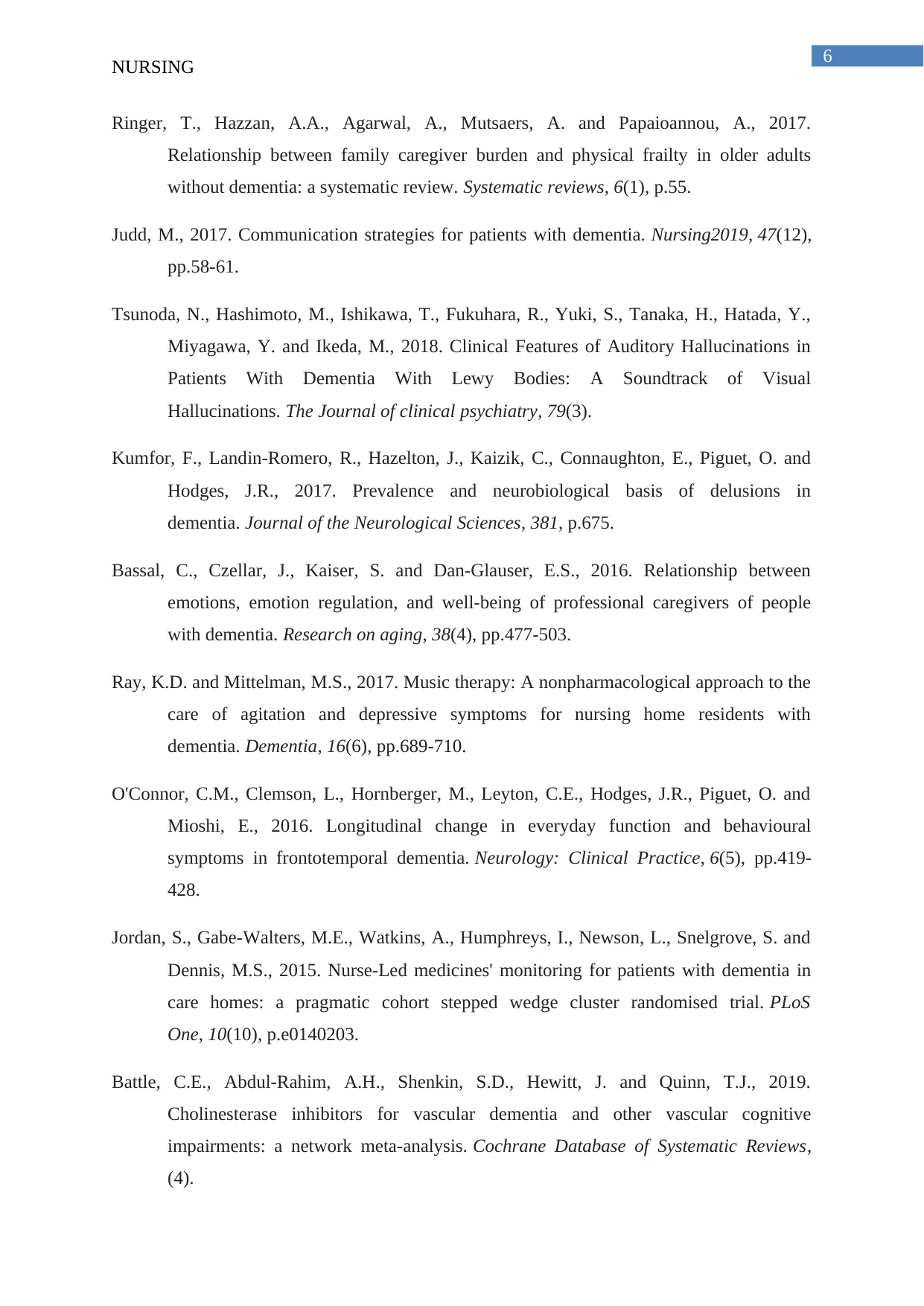
6
NURSING
Ringer, T., Hazzan, A.A., Agarwal, A., Mutsaers, A. and Papaioannou, A., 2017.
Relationship between family caregiver burden and physical frailty in older adults
without dementia: a systematic review. Systematic reviews, 6(1), p.55.
Judd, M., 2017. Communication strategies for patients with dementia. Nursing2019, 47(12),
pp.58-61.
Tsunoda, N., Hashimoto, M., Ishikawa, T., Fukuhara, R., Yuki, S., Tanaka, H., Hatada, Y.,
Miyagawa, Y. and Ikeda, M., 2018. Clinical Features of Auditory Hallucinations in
Patients With Dementia With Lewy Bodies: A Soundtrack of Visual
Hallucinations. The Journal of clinical psychiatry, 79(3).
Kumfor, F., Landin-Romero, R., Hazelton, J., Kaizik, C., Connaughton, E., Piguet, O. and
Hodges, J.R., 2017. Prevalence and neurobiological basis of delusions in
dementia. Journal of the Neurological Sciences, 381, p.675.
Bassal, C., Czellar, J., Kaiser, S. and Dan-Glauser, E.S., 2016. Relationship between
emotions, emotion regulation, and well-being of professional caregivers of people
with dementia. Research on aging, 38(4), pp.477-503.
Ray, K.D. and Mittelman, M.S., 2017. Music therapy: A nonpharmacological approach to the
care of agitation and depressive symptoms for nursing home residents with
dementia. Dementia, 16(6), pp.689-710.
O'Connor, C.M., Clemson, L., Hornberger, M., Leyton, C.E., Hodges, J.R., Piguet, O. and
Mioshi, E., 2016. Longitudinal change in everyday function and behavioural
symptoms in frontotemporal dementia. Neurology: Clinical Practice, 6(5), pp.419-
428.
Jordan, S., Gabe-Walters, M.E., Watkins, A., Humphreys, I., Newson, L., Snelgrove, S. and
Dennis, M.S., 2015. Nurse-Led medicines' monitoring for patients with dementia in
care homes: a pragmatic cohort stepped wedge cluster randomised trial. PLoS
One, 10(10), p.e0140203.
Battle, C.E., Abdul‐Rahim, A.H., Shenkin, S.D., Hewitt, J. and Quinn, T.J., 2019.
Cholinesterase inhibitors for vascular dementia and other vascular cognitive
impairments: a network meta‐analysis. Cochrane Database of Systematic Reviews,
(4).
NURSING
Ringer, T., Hazzan, A.A., Agarwal, A., Mutsaers, A. and Papaioannou, A., 2017.
Relationship between family caregiver burden and physical frailty in older adults
without dementia: a systematic review. Systematic reviews, 6(1), p.55.
Judd, M., 2017. Communication strategies for patients with dementia. Nursing2019, 47(12),
pp.58-61.
Tsunoda, N., Hashimoto, M., Ishikawa, T., Fukuhara, R., Yuki, S., Tanaka, H., Hatada, Y.,
Miyagawa, Y. and Ikeda, M., 2018. Clinical Features of Auditory Hallucinations in
Patients With Dementia With Lewy Bodies: A Soundtrack of Visual
Hallucinations. The Journal of clinical psychiatry, 79(3).
Kumfor, F., Landin-Romero, R., Hazelton, J., Kaizik, C., Connaughton, E., Piguet, O. and
Hodges, J.R., 2017. Prevalence and neurobiological basis of delusions in
dementia. Journal of the Neurological Sciences, 381, p.675.
Bassal, C., Czellar, J., Kaiser, S. and Dan-Glauser, E.S., 2016. Relationship between
emotions, emotion regulation, and well-being of professional caregivers of people
with dementia. Research on aging, 38(4), pp.477-503.
Ray, K.D. and Mittelman, M.S., 2017. Music therapy: A nonpharmacological approach to the
care of agitation and depressive symptoms for nursing home residents with
dementia. Dementia, 16(6), pp.689-710.
O'Connor, C.M., Clemson, L., Hornberger, M., Leyton, C.E., Hodges, J.R., Piguet, O. and
Mioshi, E., 2016. Longitudinal change in everyday function and behavioural
symptoms in frontotemporal dementia. Neurology: Clinical Practice, 6(5), pp.419-
428.
Jordan, S., Gabe-Walters, M.E., Watkins, A., Humphreys, I., Newson, L., Snelgrove, S. and
Dennis, M.S., 2015. Nurse-Led medicines' monitoring for patients with dementia in
care homes: a pragmatic cohort stepped wedge cluster randomised trial. PLoS
One, 10(10), p.e0140203.
Battle, C.E., Abdul‐Rahim, A.H., Shenkin, S.D., Hewitt, J. and Quinn, T.J., 2019.
Cholinesterase inhibitors for vascular dementia and other vascular cognitive
impairments: a network meta‐analysis. Cochrane Database of Systematic Reviews,
(4).
1 out of 7
Related Documents
Your All-in-One AI-Powered Toolkit for Academic Success.
+13062052269
info@desklib.com
Available 24*7 on WhatsApp / Email
![[object Object]](/_next/static/media/star-bottom.7253800d.svg)
Unlock your academic potential
© 2024 | Zucol Services PVT LTD | All rights reserved.





